- Home
- H. Beam Piper
TIME PRIME Page 12
TIME PRIME Read online
Page 12
Shoving in the starting lever, he relaxed in one of the chairs, waiting for the transposition field to build up around him, and fell asleep before the mesh dome of the conveyer had vanished. He woke, the list of time-line designations in his hand, when the conveyer rematerialized on Home Time Line. Putting it in his pocket, he hurried to an antigrav shaft and floated up to the floor on which Tortha Karf ’s office was.
I
Tortha Karf was asleep in his chair; Dalla was eating a dinner that had been brought in to her—something better than the sandwich and mug of coffee Vall had mentioned to Thalvan Dras. Several of the bureau chiefs who had been there when he had gone out had left, and the psychist who had taken charge of the prisoner was there.
“I think he’s coming out of the drug, now,” he reported. “Still asleep, though. We want him to awaken naturally before we start on him. They’ll call me as soon as he shows signs of stirring.”
“The Opposition’s claiming, now, that we drugged and hypnotized Salgath into making that visiscreen confession,” Dalla said. “Can you think of any way you could do that without making the subject incapable of lying?”
“Pseudo-memories,” the psychist said. “It would take about three times as long as the time between Salgath Trod’s departure from his apartment and the time of the telecast, though—”
“You know much higher math?” Vall asked the psychist.
“Well, enough to handle my job. Neuron-synapse inter-relations, memory-andassociation patterns, that kind of thing, all have to be expressed mathematically.”
Vall nodded and handed him the time-line designation list. “See any kind of a pattern there?” he asked.
The psychist looked at the paper and blanked his face as he drew on hypnotically- acquired information. “Yes. I’d say that all the numbers are related in some kind of a series to some other number. Simplified down to kindergarten level, say the difference between A and B is, maybe, one-decillionth of the difference between X and A, and the difference between B and C is one-decillionth of the difference between X and B, and so on—”
A voice came out of one of the communication boxes: “Dr. Nentrov; the patient’s out of the drug, and he’s beginning to stir about.”
“That’s it,” the psychist said. “I have to run.” He handed the sheet back to Vall, took a last drink from his coffee cup, and bolted out of the room.
Dalla picked up the sheet of paper and looked at it. Vall told her what it was. “If those time-lines are in regular series, they relate to the base line of operations,” she said. “Maybe you can have that worked out. I can see how it would be; a stated interval between the Esaron Sector lines, to simplify transposition control settings.”
“That was what I was thinking. It’s not quite as simple as Dr. Nentrov expressed it, but that could be the general idea. We might be able to work out the location of the base line from that. There seems to be a break in the number sequence in here; that would be the time-line Skordran Kirv found those slaves on.”
He reached for the pipe he had left on the desk when he had gone to Police Terminal and began filling it. A little later, a buzzer sounded and a light came on one of the communication boxes. He flipped the switch and said, “Verkan Vall here.”
Sothran Barth’s voice came out of the box. “They’ve just brought in Salgath Trod’s servants. Picked them up as they came out of the house conveyer at the apartment building. I don’t believe they know what’s happened.”
Vall flipped a switch and twiddled a dial; a viewscreen lit up, showing the landing stage. The police car had just landed: one detective had gotten out, and was helping the girl, Zinganna, who had been Salgath Trod’s housekeeper and mistress, to descend.
She was really beautiful, Vall thought: rather tall, slender, with dark eyes and a creamy light-brown skin. She wore a black cloak and, under it, a black and silver evening gown. A single jewel twinkled in her black hair. She could have very easily passed for a woman of his own race.
The housemaid and the butler were a couple of entirely different articles. Both were about four or five generations from Fourth Level Primitive savagery. The maid, in garishly cheap finery, was big-boned and heavy-bodied with red-brown hair; she looked like a member of one of the northern European reindeer-herding peoples who had barely managed to progress as far as the bow and arrow. The butler was probably a mixture of half a dozen primitive races; he was wearing one of his late master’s evening suits, a bright mellow pink, which was distinctly unflattering to his complexion.
The sound-pickup was too far away to give him what they were saying, but the butler and maid were waving their arms and protesting vehemently. One of the detectives took the woman by the arm; she jerked it loose and aimed a backhand slap at him. He blocked it on his forearm. Immediately, the girl in black turned and said something to her, and she subsided.
Vall said, into the box: “Barth, have the girl in the black cloak brought down to Number Four Interview Room. Put the other two in separate detention cubicles; we’ll talk to them later.”
He broke the connection and got to his feet. “Come on, Dalla. I want you to help me with the girl.”
“Just try and stop me,” Dalla told him. “Any interviews you have with that little item, I want to sit in on.”
The Proletarian girl, still guarded by a detective, had already been placed in the interview room. The detective nodded to Vall, tried to suppress a grin when he saw Dalla behind him, and went out. Vall saw his wife and the prisoner seated, and produced his cigarette case, handing it around.
“You’re Zinganna; you’re of the household of Councilman Salgath Trod, aren’t you?” he asked.
“Housekeeper and hostess,” the girl replied. “I am also his mistress.”
Vall nodded, smiling. “Which confirms my long-standing respect for Councilman Salgath’s exquisite taste.”
“Why, thank you,” she said. “But I doubt if I was brought here to receive compliments. Or was I?”
“I’m afraid not. Have you heard the newscasts of the past few hours concerning Councilman Salgath?”
She straightened in her seat, looking at him seriously. “No. I, Nindrandigro and Calilla spent the evening on ServSec One-Six-Five. Councilman Salgath told me that he had some business and wanted them out of the apartment, and wanted me to keep an eye on them. We didn’t hear any news at all.” She hesitated. “Has anything...serious...happened?”
Vall studied her for a moment, then glanced at Dalla. There existed between himself and his wife a sort of vague, semi-telepathic, rapport; they had never been able to transmit definite and exact thoughts, but they could clearly prehend one another’s feelings and emotions. He was conscious, now, of Dalla’s sympathy for the Proletarian girl.
“Zinganna, I’m going to tell you something that is being kept from the public,” he said. “By doing so, I will make it necessary for us to detain you, at least for a few days. I hope you will forgive me, but I think you would forgive me less if I didn’t tell you.”
“Something’s happened to him,” she said, her eyes widening and her body tensing.
“Yes, Zinganna. At about 2010, this evening,” he said, “Councilman Salgath was murdered.”
“Oh!” She leaned back in the chair, closing her eyes. “He’s dead?” Then, again, statement instead of question: “He’s dead!”
For a long moment, she lay back in the chair, as though trying to reorient her mind to the fact of Salgath Trod’s death, while Vall and Dalla sat watching her. Then she stirred, opened her eyes, looked at the cigarette in her fingers as though she had never seen it before, and leaned forward to stuff it into an ash receiver.
“Who did it?” she asked, the Stone Age savage who had been her ancestor not ten generations ago peeping out of her eyes.
“The men who actually used the needlers are dead,” Vall told her. “I killed a couple of them myself. We still have to find the men who planned it. I’d hoped you’d want to help us do that, Zinganna.”
“I was afraid it was something like that,” she said. “For the last few days, well, ever since the news about the slave trade got out, he’s been worried about something. I’ve always thought somebody had some kind of a hold over him. Different times in the past, he’s done things so far against his own political best interests that I’ve had to believe he was being forced into them. Well, this time they tried to force him too far. What then?”
Vall continued the story. “So we’re keeping this hushed up, for awhile. The way we’re letting it out, Salgath Trod is still alive, on Police Terminal, talking under narco-hypnosis.”
She smiled savagely. “And they’ll get frightened, and frightened men do foolish things,” she finished. She hadn’t been a politician’s mistress for nothing. “What can I do to help?”
“Tell us everything you can,” he said. “Maybe we can be able to take such actions as we would have taken if Salgath Trod had lived to talk to us.”
“Yes, of course.” She got another cigarette from the case Vall had laid on the table. “I think, though, that you’d better give me a narco-hypnosis. You want to be able to depend on what I’m going to tell you, and I want to be able to remember things exactly.”
Vall nodded approvingly and turned to Dalla. “Can you handle this yourself?” he asked. “There’s an audio-visual recorder on now; here’s everything you need.”
Dalla nodded.
He opened the drawers in the table to show her the narco-hypnotic equipment. “And the phone has a whisper mouthpiece; you can call out without worrying about your message getting into Zinganna’s subconscious. Well, I’ll see you when you’re through; you bring Zinganna to Police Terminal; I’ll probably be there.”
II
Verkan went out, closing the door behind him, and went down the hall, meeting the officer who had taken charge of the butler and housemaid.
“We’re having trouble with them, sir,” he said. “Hostile. Yelling about their rights, and demanding to see a representative of Proletarian Protective League.”
Vall mentioned the Proletarian Protective League with unflattering vulgarity. “If they don’t cooperate, drag them out and inject them and question them anyhow.”
The detective-lieutenant looked worried. “We’ve been taking a pretty high hand with them as it is,” he protested. “It’s safer to kill a Citizen than bloody a Prole’s nose; they have all sorts of laws to protect them.”
“There are all sorts of laws to protect the Paratime Secret,” Vall replied. “And I think there are one or two laws against murdering members of the Executive Council. In case P.P.L. makes any trouble, they aren’t here; they have faithfully joined their beloved master in his refuge on Pol-Term. But one or both of them work for the Organization.”
“You’re sure of that?”
“The Organization is too thorough not to have had a spy in Salgath’s household. It wasn’t Zinganna, because she’s volunteered to talk to us under narco-hyp. So who does that leave?”
“Well, that’s different; that makes them suspects.” The lieutenant seemed relieved. “We’ll pump that pair out right away.”
When he got back to Tortha Karf ’s office, the Chief was awake, and doodling on his notepad with his multicolor pen. Vall looked at the pad and winced; the Chief was doodling bugs again—red ants with black legs, and blue-and-green beetles. Then he saw that the psychist, Nentrov Dard, was drinking straight 150- proof palm rum.
“Well, tell me the worst,” he said.
“Our boy’s memory-obliterated,” Nentrov Dard said, draining his glass and filling it again. “And he’s plastered with pseudo-memories a foot thick. It’ll be five or six ten-days before we can get all that stuff peeled off and get him unblocked. I put him to sleep and had him transposed to Police Terminal. I’m going there myself tomorrow morning, after I’ve had some sleep, and get to work on him. If you’re hoping to get anything useful out of him in time to head off this Council crisis that’s building up, just forget it.”
“And that leaves us right back with our old friends, the Wizard Traders,” Tortha Karf added. “And if they’ve decided to suspend activities on the Kholghoor Sector, too—” He began drawing a big blue and black spider in the middle of the pad.
Nentrov Dard crushed out his cigar, drank his rum, and got to his feet.
“Well, good night, Chief, Vall. If you decide to wake me up before 1000, send somebody you want to get rid of in a hurry.” He walked around the deck and out the side door.
“I hope they don’t,” Vall said to Tortha Karf. “Really, though, I doubt if they do. This is their chance to pick up a lot of slaves cheaply; the Croutha are too busy to bother haggling. I’m going through to Pol-Term now; when Dalla and Zinganna get through, tell them to join me there.”
On Police Terminal, he found Kostran Galth, the agent who had been selected to impersonate Salgath Trod. After calling Zulthran Torv, the mathematician in charge of the Computer Office and giving him the Esaron time-line designations and Nentrov Dard’s ideas about them, he spent about an hour briefing Kostran Galth on the role he was to play. Finally, he undressed and went to bed on a couch in the rest room behind the office.
It was noon when he woke. After showering, shaving and dressing hastily, he went out to the desk for breakfast, which arrived while he was putting a call through to Ranthar Jard, at Nharkan Equivalent.
“Your idea paid off, Chief ’s Assistant,” the Kholghoor SecReg Subchief told him. “The slaves gave us a lot of physical description data on the estate, and told us about new fields that had been cleared, and a dam this Lord Ghromdour was building to flood some new rice-paddies. We located a belt of about five parayears where these improvements had been made: we started boomeranging the whole belt, time-line by time-line. So far, we have ten or fifteen pictures of the main square at Sohram showing Croutha with firearms, and pictures of Wizard Trader camps and conveyer heads on the same time-lines. Here, let me show you; this is from an airboat over the forest outside the equivalent of Sohram.”
There was no jungle visible when the view changed; nothing but clusters of steel towers and platforms and buildings that marked conveyer heads, and a large rectangle of red-and-white antigrav-buoys moored to warn air traffic out of the area being boomeranged. The pickup seemed to be pointed downward from the bow of an airboat circling at about ten thousand feet.
“Balls ready to go,” a voice called, and then repeated a string of time-line designations. “Estimated return, 1820, give or take four minutes.”
“Varth,” Ranthar Jard said, evidently out of the boat’s radio. “Your telecast is being beamed on Dhergabar Equivalent; Chief ’s Assistant Verkan is watching. When do you estimate your next return?”
“Any moment, now, sir; we’re holding this drop till they rematerialize.”
Vall watched unblinkingly, his fork poised halfway to his mouth. Suddenly, about a thousand feet below the eye of the pickup, there was a series of blue flashes, and, an instant later, a blossoming of red-and-white parachutes, ejected from the photo-reconnaissance balls that had returned from the Kholghoor Sector.
“All right; drop away,” the boat captain called. There was a gush from underneath of eight-inch spheres, their conductor-mesh twinkling golden-bright in the sunlight. They dropped in a tight cluster for a thousand or so feet and then flashed and vanished. From the ground, six or eight aircars rose to meet the descending parachutes and catch them.
The screen went cubist for a moment, and then Ranthar Jard’s swarthy, widejawed face looked out of it again. He took his pipe from his mouth. “We’ll probably get a positive out of the batch you just saw coming in,” he said. “We get o
ne out of about every two drops.”
“Message a list of the time-line designations you’ve gotten so far to Zulthran Torv at Computer Office here,” Vall said. “He’s working on the Esaron Sector dope; we think a pattern can be established. I’ll be seeing you in about five hours; I’m rocketing out of here as soon as I get a few more things cleared up here.”
Zulthran Torv, normally cautious to the degree of pessimism, was jubilant when Vall called him.
“We have something, Vall,” he said. “It is, roughly, what Dr. Nentrov suggested— each of the intervals between the designations is a very minute but very exact fraction of the difference between the lesser designation and the base-line designation.”
“You have the base-line designation?” Vall demanded.
“Oh, yes. That’s what I was telling you. We worked that out from the designations you gave me.” He recited it. “All the designations you gave me are—”
Vall wasn’t listening to him. He frowned in puzzlement. “That’s not a Fifth Level designation,” he said. “That’s First Level!”
“That’s correct. First Level Abzar Sector.”
“Now why in blazes didn’t anybody think of that before?” he marveled, and as he did, he knew the answer. Nobody ever thought of the Abzar Sector. Twelve millennia ago, the world of the First Level had been exhausted; having used up the resources of their home planet, Mars, a hundred thousand years before, the descendants of the population that had migrated across space had repeated on the third planet the devastation of the fourth. The ancestors of Verkan Vall’s people had discovered the principle of Paratime Transposition and had begun to exploit an infinity of worlds on other lines of probability. The people of the First Level Dwarma Sector, reduced by sheer starvation to a tiny handful, had abandoned their cities and renounced their technologies and created for themselves a farm-and-village culture without progress or change or curiosity or struggle or ambition, and a way of life in which every day was like every other day that had been or that would come.

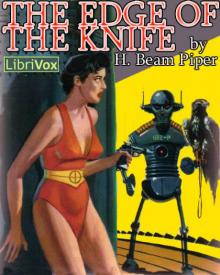 The Edge of the Knife
The Edge of the Knife Genesis
Genesis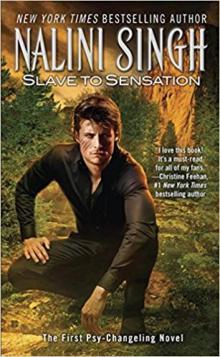 A Slave is a Slave
A Slave is a Slave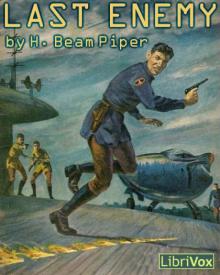 Last Enemy
Last Enemy Uller Uprising
Uller Uprising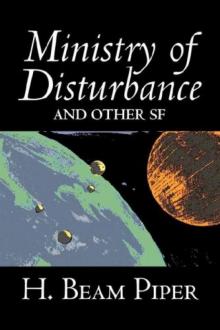 Ministry of Disturbance
Ministry of Disturbance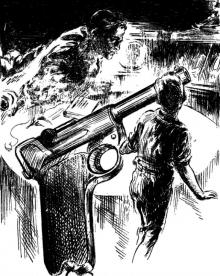 Time and Time Again
Time and Time Again The Mercenaries
The Mercenaries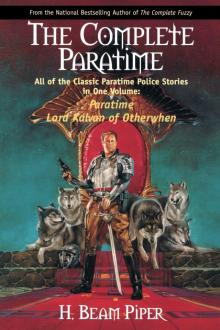 Police Operation
Police Operation He Walked Around the Horses
He Walked Around the Horses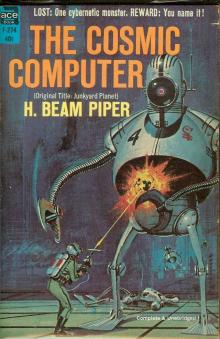 Time Crime
Time Crime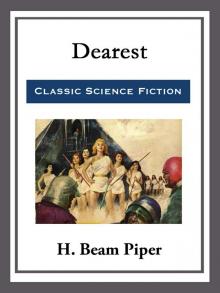 Dearest
Dearest Day of the Moron
Day of the Moron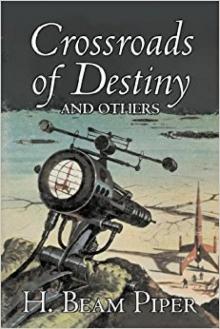 Crossroads of Destiny
Crossroads of Destiny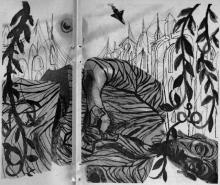 Graveyard of Dreams
Graveyard of Dreams The Cosmic Computer
The Cosmic Computer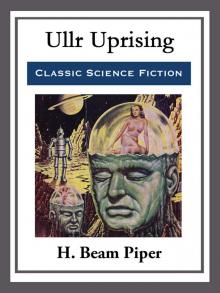 Ullr Uprising
Ullr Uprising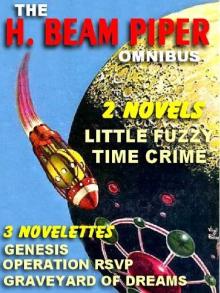 Operation R.S.V.P.
Operation R.S.V.P.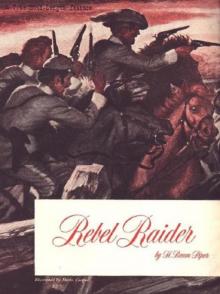 Rebel Raider
Rebel Raider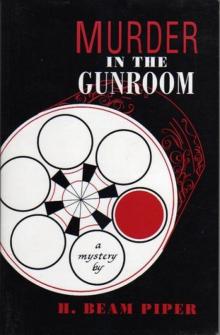 Murder in the Gunroom
Murder in the Gunroom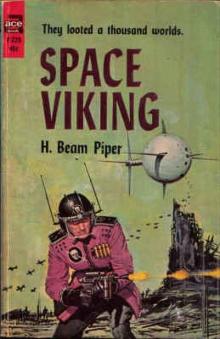 Space Viking
Space Viking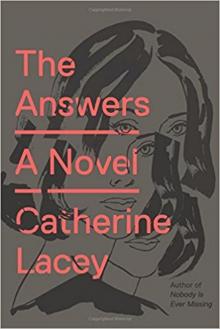 The Answer
The Answer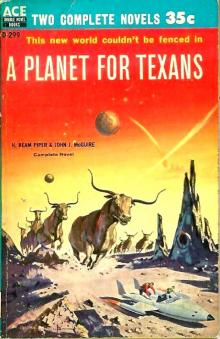 A Planet for Texans (aka Lone Star Planet)
A Planet for Texans (aka Lone Star Planet)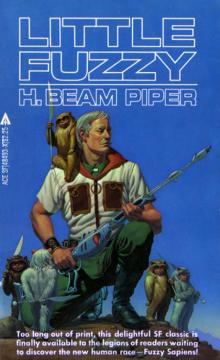 Little Fuzzy
Little Fuzzy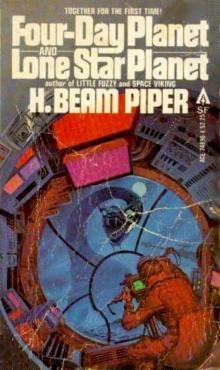 Four-Day Planet
Four-Day Planet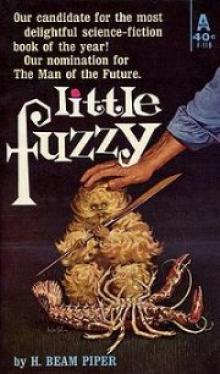 Little Fuzzy f-1
Little Fuzzy f-1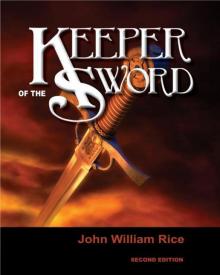 Keeper
Keeper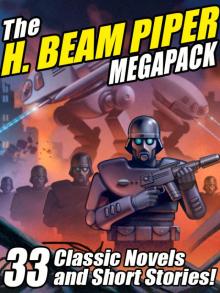 The H. Beam Piper Megapack
The H. Beam Piper Megapack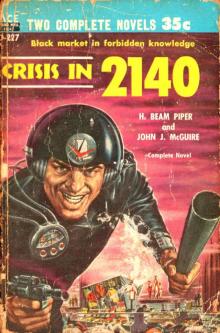 H. Beam Piper
H. Beam Piper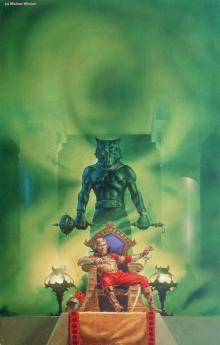 Lord Kalvan of Otherwhen
Lord Kalvan of Otherwhen Fuzzy Sapiens f-2
Fuzzy Sapiens f-2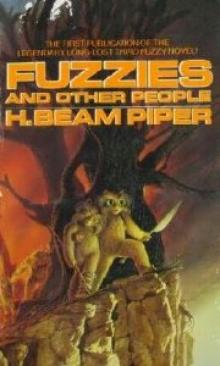 Fuzzies and Other People f-3
Fuzzies and Other People f-3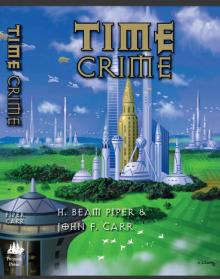 TIME PRIME
TIME PRIME Fuzzy Sapiens
Fuzzy Sapiens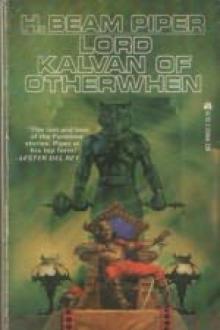 Lord Kalvan of Otherwhen k-1
Lord Kalvan of Otherwhen k-1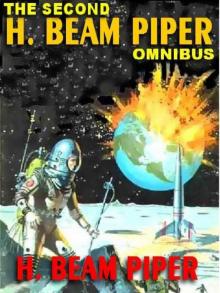 The Second H. Beam Piper Omnibus
The Second H. Beam Piper Omnibus